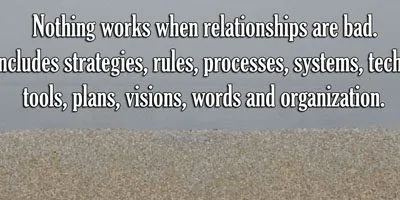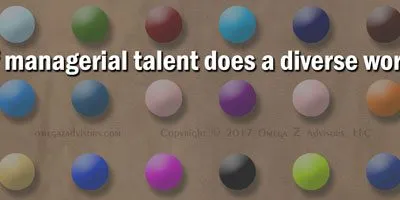Creative Innovation (Pt 12): Associative Thinking
It’s difficult to discuss creative innovation without addressing associative thinking (aka Intersectional ThinkingTM). It’s the act of comparing something to another to... Read More
Toxic Soil Analogy: Good Ideas Planted on Bad Relationships
Posted on23 Apr 2012
Tagsanalogy, cognitive bias, conflict, conflict management, organizational culture, diversity, emotions, employees, facts, heartfelt, ideas, leadership, management, minds, perception, rationale, relationships, strategy, Toxic Soil Analogy, vision
Comments7
Imagine soil so toxic that nothing will grow. No matter how good our seeds, our farming techniques and the weather are; nothing... Read More
Cooperation vs. Self-interest (Pt 5): Humans vs. Apes
Posted on08 Dec 2011
Tagsapes, context, cooperation, Cooperation vs Self-interest Series, diversity, Elizabeth Kolbert, empathy, employees, humans, intelligence, intrinsic, Max Planck Institute for Evolutionary Anthropology, Michael Tomasello, problem solving, self-interest, Sleeping With The Enemy, The New Yorker
Comments2
In a previous post, I briefly mentioned the work of Michael Tomasello of the Max Planck Institute for Evolutionary Anthropology as reported... Read More
Star Wars, Women & The Good Guys
Posted on31 Oct 2011
Tagswomen, Star Wars, Personality, good vs evil, emotions, diversity, organizational culture, business
Comments0
If you examine the two opposing sides in the Star Wars Epic, The Empire (Bad Guys) and The Rebels (Good Guys), there... Read More
Diverse Workforce Means Rethinking Talent to Manage It
Posted on27 Oct 2011
Tagsmanagement, homophily, The Atlantic, Talent, social skills, Richard Florida, Personality, networking, market, innovation, diversity, creativity, change management, adaptability
Comments0
In the October 2011 issue of The Atlantic, I ran across Richard Florida’s article, “Where the Skills Are” and found myself rethinking... Read More
Correlation: High Testosterone and Poor Risk Assessment
Posted on24 Oct 2011
Tagsfree will, biochemical, Cambridge University, decisions, diversity, emotions, employees, failure, hubris, John Coates, management, Personality, process, technology, The Economist
Comments0
When I’ve written about the illusion of free will, I’ve focused on the advancement of technology and research methodologies to uncover subconscious... Read More
Emotional Self-defense for Sensitive People (Pt 7): Team Intelligence
Posted on05 Sep 2011
TagsAnita Woolley, diversity, emotional intelligence, Emotional Self Defense Series, emotions, feelings, group, Harvard Business Review, informal organizational power, intelligence, listen, organization, Performance, relationships, sensitive people, sensitivity, Talent, team building, team intelligence, Thomas Malone, women
Comments0
Sensitive people (SP) can increase team intelligence in very much the same way mortar makes brick and stone walls stronger. Since diverse... Read More
Innovation: Challenges from a Relationship Perspective
Posted on09 Jun 2011
TagsChallenge, art, diversity, failure, innovation, Malcolm Gladwell, oak tree, Personality, Picasso, relationships, Steve Jobs, The New Yorker, Xerox, creativity acorns analogy
Comments1
Malcolm Gladwell’s article “Creation Myth” in the May 16, 2011 edition of The New Yorker was the best article I’ve read about... Read More
Accounting for Unconscious Biases in Your Decision Making?
Posted on16 Dec 2010
Tagsabilities, behavioral economics, budgets, Dan Lovallo, decisions, dissent, diversity, economics, leadership, management, McKinsey & Company, Olivier Sibony, optimism, self-interest, uncertainty, unknown
Comments0
The article, The Case for Behavioral Strategy, (PDF) by Dan Lovallo and Olivier Sibony* from the March 2010 McKinsey Quarterly states: Once... Read More



